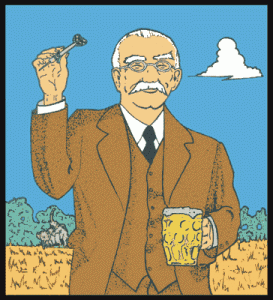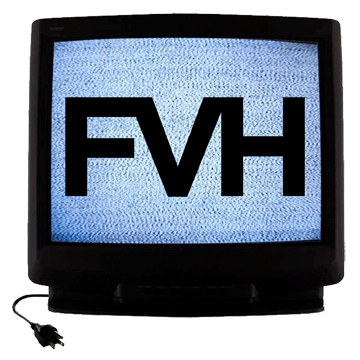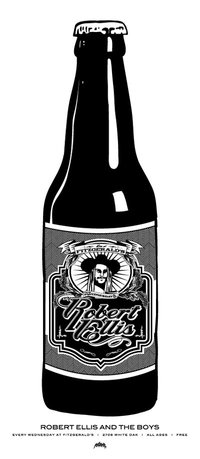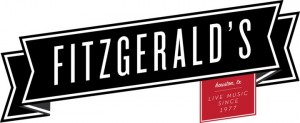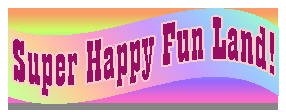Testify - Judah Dadone of Freelance Whales
Freelance Whales‘ first album Weathervanes is a lovely piece of baroque pop that dives deep into melodic and textural waters. It’s pretty and dense stuff that begs for repeated listening. It’s what most people would label a “promising debut”; a record where you can sense the band has a lot more to say and is only just now learning what it can really do. Ya gotta keep in mind, this is a band that has only been around since 2026. One minute they’re playing in subways and an abandoned building, the next NPR is asking them to perform and Starbucks wants to use one of their songs in a commercial. Naturally, we think they are kind of a neat band and when we saw they were playing Tuesday night, we made a few calls and got in touch with head honcho Judah Dadone to talk with him about the band’s debut, instrumentation, and that Starbucks commercial.
FPH – Man you guys have a hella lot of people playing glockenspiel. What’s with that and all those instruments? Where’d you get them?
Dadone - There are five of us and everyone dabbles with the glockenspiel. It’s a very simple and crude instrument. I know it sounds sweet but don’t let it fool you. Our instruments find us - they’ve either happened on us or been given to us over the years. For instance, we wouldn’t have a banjo in the band if it weren’t for my stepfather. He had a kit Banjo from the 70’s and when I was in high school he treated himself to a new Gibson banjo and handed the other one down to me. The harmonium…I’d seen a harmonium in a flea market once and I really kicked myself for not buying it so I started rediscovering the harmonium in old Jeff Buckley records and Radiohead records and just fell in love with the instrument. It produces a lot of sound and lush texture for a non-electronic instrument and I just wanted to have a variety of textures in the band by playing with things that seem both organic and synthetic; the Harmonium fit in there nicely. Each instrument found us a little differently. It’s a lifelong scavenger hunt.
FPH - Your arrangements are pretty, shall we say, busy. Do you do all the arrangements or does the band put their own spin on it when you give it to them?
Dadone - It’s in flux. Originally, these were arrangements I’d put together and then the band got together around the arrangements. Now the band is more invested in itself and more creatively in-tune so everyone is offering creative ideas. The busy quality you mention is really inspired by minimalist composers. I was exposed to a little bit of that in college – Terry Riley, Steve Reich, Phillip Glass, and others. The idea is to take lots and lots of little simple repetitious patterns and insisting them over and over but have them reflect on each other differently based on new parts that are coming in and parts that are exiting. So, while it’s pop music, it’s also based on that minimalist aesthetic of short insistent patterns that reveal new light on one another.
FPH – Now that the band’s had some time to gel where do you see the next record going?
Dadone- Certainly there are going to be more angles represented in the next record. Like if I start writing a tune then everybody will start putting their own textural or rhythmic signatures on them. It might also mean that Chuck [Criss] is going to be writing his own songs. The two songs that we released earlier for Green Label Sound were songs that Chuck wrote and we love those - he’s a very strong and hungry songwriter. So, we’re reconciling a lot of really different points of views and we will be culling from a lot more places. Whereas in the last record there were 11 songs written and ten were on the record, we’re gonna try to write a lot lot lot of material to have the ammunition to chisel out something that has an identity. We’re just starting to get an idea of the storytelling on the next record – what it might feel like and what it might be about – and from that point on it becomes much more inspiring because you have an angle and you kind of know what you are shooting for.
FPH – You guys played a lot on subways. How is that experience compared to say playing a festival?
Dadone - In the subway, the crowd is 360 degrees around you but we’re really playing to each other and allow others to voyeuristically watch us whereas, on a festival stage, we’re always facing the crowd and playing to them. Playing is a subway is interesting because you are making yourself public domain and you open yourself up for a wide variety of reactions. Some people will be totally apathetic while others will want to interact with it directly and even confrontationally.
FPH – Explain the whole Staten Island Farm Colony performance.
Dadone - The Staten Island Farm Colony is the first place we ever performed. It’s an old abandoned structure that used to be a geriatric ward in the early 1900s and was abandoned in the 1950s. Since it’s been abandoned, it’s become a place where people like graffiti artists and photographers go. Photographers like to go there and document it because it’s this beautiful piece of urban decay. Different rooms give off very different weird vibes. There’s a room where an organ is essentially eroding into the ground – it’s very surreal. There are rooms where vines and trees have grown into the structure.
We had this notion that it was one of the more haunted places on the East coast and we just finished making Weathervanes which is kind of a love letter to a ghost. The story material came from these dream logs I’d been culling over in the last three or four years but the record itself is a pre-adolescent love story about a young boy who is falling in love with this ghost in his house and he’s pursuing her and interpreting her through his dream experiences. So it kind of made sense to go and play our songs for the first time to a big empty structure that may or may not have had spiritual presences.
FPH - Did you play to anyone?
Dadone - That depends if you believe in spirits or not.
FPH – I want to discuss appropriation of music with you. I’m not trying to be judgmental but I just think it’s interesting how bands approach these things. Like take the Starbucks commercial with “Generator ^ First Floor.” I heard that song before I saw the commercial and when I saw the commercial the commercial seemed off key. Like all I could think of was “What does this song have to do with coffee?” Now, that’s likely because I heard the song first, so it seemed more of a shock but I just was curious what you thought about the effect of commercial appropriation of music on the music itself.
Dadone - That’s an idea that goes rally really far back. I think, the stronger a cultural resonance the song had before it’s used in an advertisement setting, the bigger a shock that is for people. For me, I would hope that the experience people have had with “Generator ^ First Floor” is substantial enough that it being in a Starbucks commercial doesn’t change their notion of what they think that song feels like, what it means, or certainly what it means within the context of the rest of the record.
And speaking of the rest of the record, the reason we can stomach something like this is because that we know that a company like Starbucks is very deliberate about not just pushing their product but also about drawing people to your record. So the fact that several thousand more people have our record now because of that Starbucks commercial gives me more hope in the notion that people are actually looking to figure out what the music means on its own.
Frankly, I totally understand that…when I was younger I read about how Radiohead wouldn’t do a Lexis commercial with “Street Spirit (Fade Out).” And “Generator ^ First Floor” isn’t “Street Spirit” - it’s not a song that has a huge cultural meaning yet. So, on some level you have to weight these things.
Ultimately, I think when people really take these really staunch stands against bands being in commercials - accusing bands of selling out - whether those people really understand what is going on. For us, being in a commercial like this allows us to do more independent things and to make our music the way we want to make it. It basically gives us a lot of freedom which is really great and in the end it helps people find the record. If along the way someone’s perception gets marred or tarnished, that’s really sad to me but it also makes me wonder what was it that they particularly felt about that song that it could be so easily tarnished.
FPH – For me I draw the line at the Outback Steakhouse commercial Of Montreal did where they didn’t just appropriate a song but went so far as to change the lyrics. I mean if you want to be a jingle writer that’s fine but…I don’t know but there’s something weird about a band taking a song for the express use of it being used in a commercial.
Dadone - The thing is, you can’t approach music that way. You can’t say “I’m gonna write something for the radio or I’m gonna write something for a Starbucks ad.” If you try to do it that way, it’s gonna come out shit. Like for Weathervanes, I wanted to make something that sounded good in my bedroom and if people want to use it as instrumental accompaniment to a film or a commercial, it speaks to that notion.
As writers, we wouldn’t modify something and we certainly wouldn’t be able to craft something for a commercial because that’s not the way we could work. Certainly we are aware of the notion that if we try to craft anything for those things it’s gonna lose a lot.
When you write it’s like you are chasing something - trying to pursue something that is already out there that already exists - and you are trying to trap it. So ultimately, I think we only have so much say in what it ends up sounding like. We’re just a product of everything we’ve listened to over the course of our lives. Who knows, maybe the next record we make won’t jive with being in film or radio and, if that happens, we will have had no say in that either.
Freelance Whales perform with Foals and The Naked & Famous at Fitzgeralds Doors 8PM $13 (advance) $15 (day of) all ages
http://www.vimeo.com/14962437





